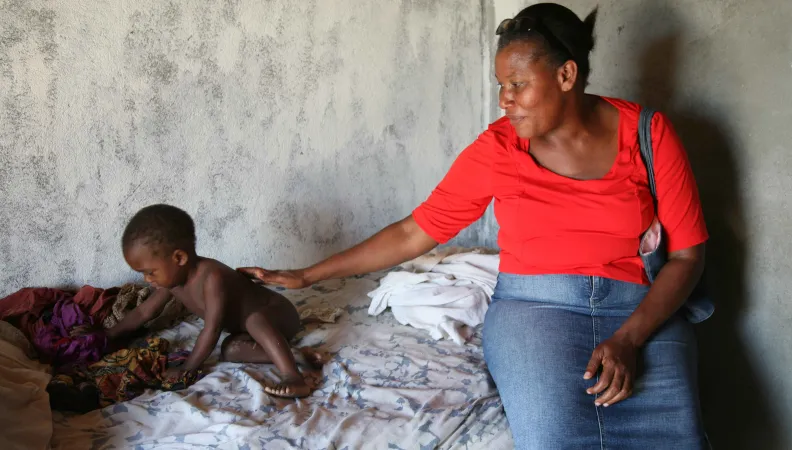Share the page
Haiti: Continuing to Improve Maternal and Child Health Services
Published on

Haiti has the highest rates of maternal, child and under-five infant mortality in the Americas. With the country's health sector sorely lacking in trained personnel and financial resources, AFD is building on its commitment to improve Haiti’s maternal and child health services. One project, "Ti Mama 2” is at the center of such efforts to invest in the health sector.
Maternal deaths due to obstructed labor, untreated infection, preterm delivery and eclampsia (a form of toxemia of pregnancy, characterized by hypertension, and convulsions) are all too common in Haiti, and their incidence could be reduced. But due to the poor quality and limited deployment of essential services, many women and their children do not get the care they need in time.
In Haiti’s health sector there is a marked shortage of equipment, financing and professional skills adapted to the country’s needs. Health centers also need to be regularly rebuilt and restored due to the frequent occurrence of natural disasters, such as floods, earthquakes, mudslides and hurricanes.
“Our health center is located in an area where access is extremely difficult. There are hardly any roads nearby and most homes are on the hillsides,” says Christiane Bernard, a nurse-midwife and director of the Saint-Joseph des Abricots health center in the south of the country. “The population lives in extremely precarious conditions.”
Increasing the quality and availability of healthcare services
Working with a modest annual budget of $100 million (€92 million), the Health Ministry has made maternal and child health one of the priorities of its National Strategic Plan on Sexual and Reproductive Health 2019-2023.
Women have traditionally given birth at home, assisted by Haiti’s traditional midwives in far from optimal health conditions. Via health workers and midwives, the Health Ministry is informing people about childbirth in health facilities and antenatal and post-natal consultations.
Thanks in part to AFD funding, the Ti Mama 1 project was launched in the southern, Grand’Anse and northwest departments in 2016 to improve the management of health institutions. Ti Mama 2 has been addressing similar issues in the same departments since 2020.
“This €9 million grant, which includes an additional €1 million following the damage to health centers caused by the earthquake in 2021, aims to improve the quality and availability of maternal and child health services, as well as family planning (MCH/FP),” says Ernest Barbot, Deputy Director and team leader for this project at AFD’s Haiti office. “This makes it possible to provide quality healthcare, while reducing inequalities in access to these services, especially financial and gender inequalities.”
Seven health centers concerned
The project will rehabilitate and purchase equipment for seven health centers. Training health workers is also one of its priorities and MCH/FP staff will, as far as possible, receive on-the-job training. The objective is to create a common culture among stakeholders required to work together on the provision of care. The capacity building especially focuses on the administrative and financial management of staff in the health centers covered, as well as the management of medication, supplies and equipment.
“With the Ti Mama 2 project, our patients no longer need to go to the city for their examinations and care,” says Christiane Bernard. “The center is becoming more autonomous with comprehensive care, and the in-service training in maternity units has improved care for pregnant women. We also receive people with HIV and malnourished children. Our family planning service and a laboratory are steadily improving.”
Further reading: The Metis Fund: Allying Art and Development
In addition, Ti Mama 2 is strengthening an institutional capacity building program for the health departments of the three areas covered by the project. This supervision is key to sustaining the quality and availability of services.
The project also has a major social component. As poverty is one of the main reasons for the apparent underutilization of health services, Ti Mama 2 aims to reduce the economic barrier of transport costs, medical acts and medication by bringing quality and affordable medical services to the areas where families live.
Care for victims of violence
Women victims of violence are also being more closely identified and provided with short- and long-term care. Indeed, the organization Solidarite Fanm Ayisyèn (SOFA) is basing its action on three key areas: raising awareness among the population (community stakeholders, local elected officials, religious leaders), organizing advocacy meetings, and supporting abused women and girls at Day Care Centers called “Douvanjou”.
“Communities in the three departments are being sensitized to gender-based violence, early pregnancy and sexual and reproductive health,” says Stéphanie Siméon, project leader at Ti Mama 2 for SOFA.” They learn about how to act in situations of violence and prevent violence, and they learn about the services available to support abused women. They are given medical, legal and psycho-social support through the three Douvanjou centers.”
In schools, students benefit from information and training sessions on sexual and reproductive health and gender issues.
The project will last four years and is implemented by five Haitian and French NGOs: GRET, Initiative Développement, Entraide Médicale Internationale (EMI), SOFA and SOE.
